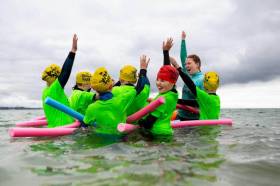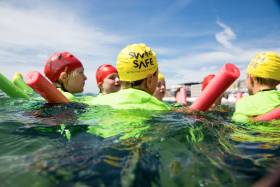Displaying items by tag: Swim Safe
‘Swim Safe’ Sessions At Lough Erne’s Share Centre This Month
The RNLI says it wants to help children Swim Safe with free water safety sessions at the Share Discovery Village on Upper Lough Erne for the first time this September.
The fun, hour-long sessions teach young people how to swim safely outdoors and what to do if they, or others, get into difficulty in the water.
There will be four sessions held each day on Saturday 14 and Sunday 15 September and there are up to 20 places available per session.
Parents and carers can book their child’s free place online at SwimSafe.org.uk
To take part, children must be aged between seven and 14 years and be able to swim 25 metres unaided.
The sessions are run by qualified swimming instructors and lifeguards, supported by a team of volunteers and give children:
- Up to 30 minutes of practical, in-water tuition led by qualified instructors.
- Essential open water safety advice.
- A free Swim Safe goody bag take home.
All the kit needed to take part, including wetsuits, swim hats and flotation equipment, is provided for each child during the sessions. Children only need to bring their swimsuit and a towel.
Ashley Jones, RNLI Swim Safe Manager, says: “Children love swimming outdoors, but it’s very different to swimming in a pool, where most children learn to swim.
“It’s essential children learn about open water safety — where it is safe to swim, how to stay safe and what to do if they get into difficulty in the water.
“We want all children to have access to this training, so all Swim Safe sessions are funded by the RNLI and Swim England partnership and so are completely free of charge.”
This year is the first time Swim Safe is being run on inland waters in Northern Ireland.
For more information about Swim Safe, visit SwimSafe.org.uk
#Swimming - Northern Ireland will be included for the first time in Swim Safe, a programme offering free outdoor swimming and water safety sessions for children aged 7-14 across the UK.
Swim Safe teaches children how to stay safe when swimming outdoors, which is often more challenging than swimming in a pool.
The programme was created by the RNLI and Swim England, the national governing body for swimming in England.
The free, hour-long Swim Safe sessions are run by qualified swimming teachers and lifeguards, supported by a team of trained volunteers, covering both land-based safety and practical tuition in the water.
Wetsuits, swimming hats and a free goody bag with a t-shirt are all provided. Children must be able to swim at least 25 metres to take part.
Since Swim Safe started in 2013 with just one site in Bude, Cornwall, over 18,000 sessions have taken place across the country – last year over 7,000 children took part in England and Wales.
Now in its fifth year, the programme continues to grow and in 2017, Swim Safe sessions will take place at 20 sites across the UK and Ireland including beaches, lakes, reservoirs and other inland locations.
“Children love swimming outdoors, but swimming in the sea, rivers and lakes is more challenging than swimming in a pool, where most lessons take place,” said Guy Botterill, Swim Safe project manager for the RNLI. “Thanks to Swim Safe, thousands of children will learn how to keep safe when swimming outdoors and know what to do if they get into trouble.”
To book a free Swim Session at Groomsport, near Bangor on Belfast Lough, visit Swimsafe.org.uk — and find out more about the programme via #SwimSafe hashtag and at Facebook.com/SwimSafeOutdoors































































